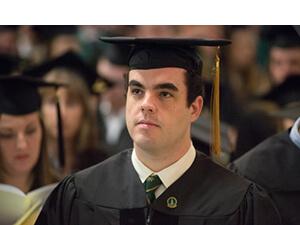M.S., Electrical Engineering, 2009
Ph.D., Electrical Engineering, 2012
"Wow! That's quite the change…" Those words could summarize the typical reaction that I get when I've told my coast-to-coast story. After finishing up graduate school at the University of Vermont, I accepted a faculty position at Oregon State University and moved out West in 2012. And I partially agree with the magnitude of that change.
Geographically, it has been a fair amount of miles. From Coast #1, growing up in Southern Spain, to Coast #2, school in New England, to Coast #3, the Pacific Northwest. That's a definition of home distributed across 5,929 miles.
On the other hand, it now feels like becoming an engineering professor was always in the making, not a big change there. I'm still passionate about the same technical challenges and social issues. I still work hard every day, am thankful to collaborate with brilliant people, and am tackling those problems from an educational perspective. Let me explain that second part in a bit more detail.
My time at UVM was the engine, catalyzer, and booster toward lifelong learning. That's the way I see academia.
I learned everything I know about power and energy systems from my Ph.D. advisor Dr. Paul Hines. It was seven in the morning when we hit the submit button for the first paper we wrote together -- after a full night of minor text edits, medium simulation tweaks, and major figure re-drawings. Despite being exhausted, the overall excitement was not going to allow for an easy sleep, so I headed to the hospital cafeteria (I seriously miss that mac and cheese) and sipped some more coffee. In my head was one thought: how was it possible for a faculty member to be so helpful and patient? Today I am fortunate enough to still be doing some exciting joint work with Paul Hines, and I keep him as a role model.
Dr. Jeff Frolik's advice was direct, at times tough, but incredibly inspiring: "Write early and often." I am still working on it, same as my students. I wonder if some of those students suspect that the reason I require them to turn in all of their assignments in LaTeX [a scientific document writing tool] is Dr. Chris Danforth's classes. He was able to revitalize my appreciation for mathematics, and I want to make sure I pay it forward. Dr. Peter Dodds, Dr. Maggie Eppstein, and many others at the Complex Systems Center got me thinking larger than electrical engineering, connecting the dots to other global challenges and big, hairy questions.
There were two other big pieces of Vermont life that I brought to Oregon with me.
The first one is rowing. I started the sport with the UVM crew team and those early, mighty-cold mornings have evolved into my preferred mode of decompression after work. Putting kilometer after kilometer on the erg machine has kept me at masters-level competition, as well as cross-trained to discover other challenges like finishing my first running marathon in Portland this past year.
The second is the seeds of leadership and service that were planted in me. At UVM I served as president for the Graduate Student Senate. It was a complicated gig, yet extremely rewarding. Our board worked very closely with the Graduate College, and what I appreciated most was how we all had the common goal of equalizing student success, independently of job titles or ranks. That crash course has come in very handy for my current role as president of the Society of Hispanic Professional Engineers, Oregon Chapter. There's a new generation of innovators and pioneers advancing engineering in a sustainable manner and whatever I can do to help realize that potential, I'm up for it.
I am now part of Beaver Nation and certainly hope that any traveling Catamounts exploring the West will consider swinging by to say "hi." Some homework for me: Go back to Vermont to visit the UVM family this year.
